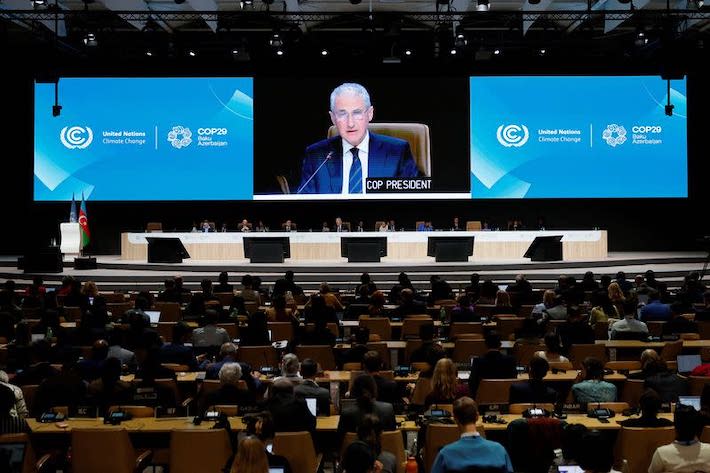The end result of the COP29 summit in Azerbaijan – which saw delegates adopt a $300 billion a year global finance target on Sunday to help poor nations cope with climate change – spurred widely varied responses.
Some delegates were overjoyed to get what they felt was a positive outcome, while others left angry and disgusted.
Indeed, when COP29 president Mukhtar Babayev stepped up to the podium at the closing meeting on Sunday morning, he reportedly carried two speeches: one hopeful, the other to announce an impasse and inability to reach a deal, two sources told Reuters.
ALSO SEE: COP29 Finance Deal Aims For $250bn From Wealthy Nations
One of the sources – a person in the COP29 presidency – said that they worked through challenging negotiations until the last minute to ensure what it called the Baku Breakthrough, but still prepared different versions of the final speech for different possible outcomes.
In the end, Babayev managed to gavel through the $300 billion finance plan to help developing nations cope with the soaring costs of global warming over the next decade before critics had time to object, allowing him to read the more positive speech.
He praised the agreement as a breakthrough and shamed the deal’s doubters as “wrong”, even as many of the climate deal’s intended recipients slammed it as woefully inadequate.
Babayev’s preparation for different outcomes at the divisive summit in the Caspian Sea nation of Azerbaijan reflected what many in the audience had already known before it began: the Baku climate talks were never going to go smoothly.
But the slow pace of progress, with global emissions still rising, has raised tensions and calls for reform.
Some 23 countries, such the US, UK, Japan and countries in the EU, will kick in the funds for recipients that include countries in Africa and South America, plus a host of small island states.
Uncertainty on whether US will honour its commitment
“This is something that needs to be looked at, when just a handful of countries, based on their own economic interests, can almost wreck the entire process,” Sierra Leone Environment Minister Jiwoh Abdulai told Reuters.
Many developing countries were bitterly disappointed by the outcome, according to a report by Carbon Brief, which said they had called for developed countries to raise $1.3 trillion a year in climate finance.
“In the end, negotiators agreed on a looser call to raise $1.3tn each year from a wide range of sources, including private investment, by 2035.”
And some countries, such as India and Nigeria, accused the COP29 presidency of pushing the deal through without their proper consent, following chaotic last-minute negotiations, it said.
“Countries failed to reach an agreement on how the outcomes of last year’s “global stocktake”, including a key pledge to transition away from fossil fuels, should be taken forward – instead shunting the decision to COP30 next year in Brazil.”
But they did manage to agree on the remaining sections of Article 6 on carbon markets, meaning all elements of the Paris Agreement have been finalised nearly 10 years after it was signed, the report said.
Among the biggest factors clouding the negotiations in Baku was the looming return of climate sceptic Donald Trump as president of the United States, the world’s biggest economy, largest historical emitter of greenhouse gases, and top producer of oil and gas.
Trump, who takes office in January, has pledged to withdraw the United States from the global Paris Agreement on climate change, as he did during his first 2017-2021 term in the White House, and has called climate change a hoax.
Negotiators at the Baku conference said that while the US delegation had helped in coming up with the climate finance deal, the country was unable to take a high-profile leadership role like it has in past climate summits, and it could not provide assurances the next administration would honour its pledges.
“With the United States, well, the voters have voted and that’s the way it is. What they’re going to do, we do not know,” South African Environment Minister Dion George said.
US officials at the COP29 conference sought to reassure global partners that market forces, existing federal subsidies, and state mandates would ensure continued renewable energy deployment even if Trump disengages from the global process.

‘Playing games with most vulnerable’
The war in Ukraine and rising conflict in the Middle East, meanwhile, have diverted global attention to security and energy availability, and led many governments to tighten their purse strings, experts said.
That made getting a bigger climate finance number hard, observers to the talks said.
“Even maintaining climate finance at current levels in the current political environment is a huge fight,” Joe Thwaites, a senior advocate on international climate finance at the Natural Resources Defense Council, an environmental group, said.
The agreement to provide $300 billion annually by 2035 would theoretically triple rich countries’ previous commitments to provide $100 billion by 2020. That earlier goal was reached in full only in 2022, and expires in 2025.
The unwillingness of wealthy countries to offer more money and the pressure to conclude even a weak deal ahead of more political turbulence became a major source of frustration for the least developed countries and small island states, who told the Baku conference they felt sidelined in the negotiations.
At one point in the summit’s final stretch, negotiating blocs representing both groups walked out of talks in protest, delaying a deal by hours.
“We came in good faith, with the safety of our communities and the well-being of the world at heart,” Tina Stege, the climate envoy for the Marshall Islands, said at the closing plenary.
“Yet, we have seen the very worst of political opportunism here at this COP, playing games with the lives of the world’s most vulnerable people.”
Indian envoy rejects outcome
Many developing countries said the outcome was a “betrayal”, while Indian envoy Chandni Raina used her time to roundly reject the climate finance deal pronounced by Babayev.
“We are disappointed in the outcome which clearly brings out the unwillingness of the developed country parties to fulfil their responsibilities,” she told the summit.
The result was “an optical illusion,” she said, adding that “this will not address the enormity of the challenge.”
Their anger stems from the fact 2024 is expected to be the hottest year ever – for the second year in a row, with global emissions still rising. The world is currently on track for temperature increases of up to 3.1C by the end of the century, according to the 2024 UN Emissions Gap report.
Climate advocates said that, while the deal is better than an outright impasse, the rifts exposed by the conference as well as the loss of trust in the process among poorer countries will pose a problem for Brazil as it prepares for COP30.
“I think this is a toxic chalice for Belem, and it’s going to be up to Brazil how they’re going to restore the trust,” said Oscar Sorria, director of The Common Initiative, a think tank focused on global financial reform.
Expectations for a deal were depressed by worries of a looming US withdrawal from global climate cooperation, geopolitical turmoil, and a rise of isolationist politics that had shunted climate change off much of the world’s top priorities list.
Those obstacles loomed large in Baku and will continue to overshadow global climate efforts in the months ahead as Brazil prepares for next year’s much broader conference in the Amazon rainforest city of Belem – where the world will plot a years-long course for steeper emission cuts and building resilience in the fight against climate change.
“Multilateralism as a whole is under threat,” Eliot Whittington, chief systems change officer at the Cambridge Institute for Sustainability Leadership, said.
“Indeed, the UNFCCC is probably the bright spot – proving that even in the face of incredibly hostile geopolitics and on fundamentally difficult questions, a deal can be made,” he said, referring to the UN body sponsoring the annual climate summit.
- Reuters with additional inputs and editing by Jim Pollard
NOTE: Additional details were added to the text on November 25, 2024.
ALSO SEE:
COP29 Carbon Markets Deal Faces Credibility Test
Could Melting Glaciers Trigger Volcanic Eruptions? – Reuters
Funding Gap Hurts Climate Talks While World Faces 3.1C Warming
Climate Change Has Cost China $32 Billion in Just One Quarter
Scientists Fear Nature’s Carbon Sinks Are Failing – Guardian
Floods or Drought: Climate Change Worsens Global Water Woes
Climate Change ‘Fuelled’ Rain That Led to Fatal Indian Landslides
Energy Emissions Set to Peak But ‘Not in Time’ For Climate Goals
























